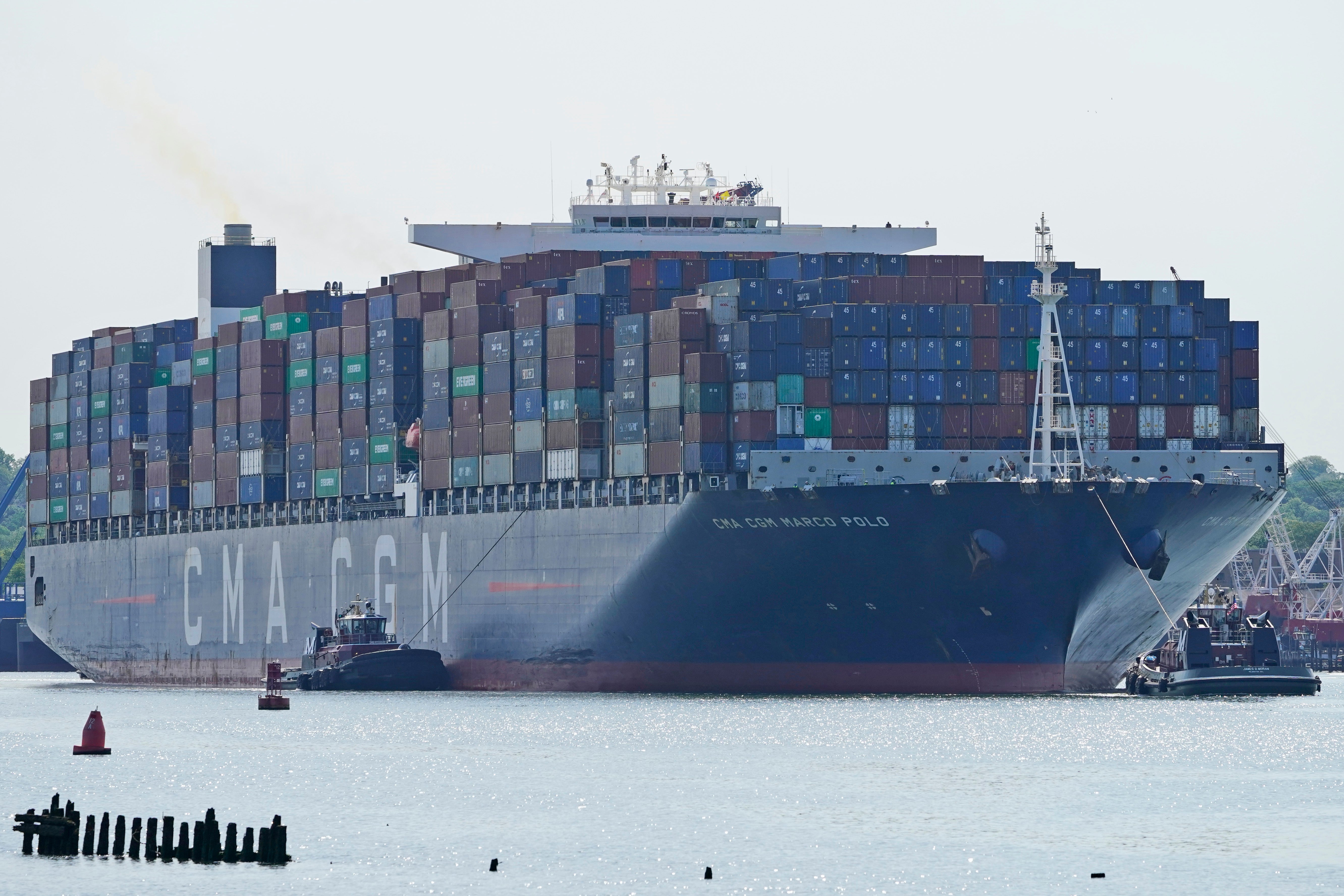Largest container ship hits East Coast as ports see surge
The CMA CGM Marco Polo has docked in New Jersey and set a record for the largest container ship to call on the East Coast

Your support helps us to tell the story
From reproductive rights to climate change to Big Tech, The Independent is on the ground when the story is developing. Whether it's investigating the financials of Elon Musk's pro-Trump PAC or producing our latest documentary, 'The A Word', which shines a light on the American women fighting for reproductive rights, we know how important it is to parse out the facts from the messaging.
At such a critical moment in US history, we need reporters on the ground. Your donation allows us to keep sending journalists to speak to both sides of the story.
The Independent is trusted by Americans across the entire political spectrum. And unlike many other quality news outlets, we choose not to lock Americans out of our reporting and analysis with paywalls. We believe quality journalism should be available to everyone, paid for by those who can afford it.
Your support makes all the difference.With the sun gleaming off the Manhattan skyline in the distance, the massive ship passed slowly underneath the Bayonne Bridge on Thursday morning, tooting its horn to the delight of about two dozen onlookers on the bridge deck hundreds of feet up.
Even by the standards of ocean carriers, the CMA CGM Marco Polo is a behemoth: three-and-a-half football fields long — standing on end, it would be roughly the height of the Eiffel Tower — it can tote more than 16,000 20-foot-long containers, of the sort tractor-trailers carry one at a time.
It's the largest container ship ever to call on the East Coast and its visit this week to New Jersey; Norfolk, Virginia; Savannah, Georgia; and Charleston, South Carolina underscores both the surging volume handled by ports nationwide as COVID-19 restrictions continue to ease, as well as the billions of dollars spent by port systems to accommodate these larger ships.
Container volume at U.S. ports lagged a year ago during the height of the pandemic as manufacturing slowed, though the demand for goods remained fairly strong as travel and leisure dollars were shifted to home improvement projects and online purchases.
Since then, volume has come roaring back. Beginning last August, monthly container volume for the 10 busiest U.S. ports has surpassed 2019 levels, according to statistics compiled by the U.S. Department of Transportation. Los Angeles the only U.S. port busier than New Jersey/New York recently had the best April in its 114-year history and has had nine straight months of year-over-year increases.
While Los Angeles has been able to accommodate ships that can carry as many as 23,000 containers, as recently as four years ago a ship the size of the Marco Polo would have bypassed the ports of New Jersey and New York because the Bayonne Bridge, which connects New Jersey and Staten Island, was too low and the port system's waterways were too shallow.
Spurred by the expansion of the Panama Canal last decade that allowed larger ships to pass through, New Jersey/New York and other East Coast ports scrambled to capitalize.
The Port Authority of New York and New Jersey spent nearly $2 billion to raise the bridge by 64 feet, a feat that required keeping the existing roadway until a higher roadway was built on top of it; a separate project costing about the same amount deepened the channel in New York harbor.
Savannah's port, the fourth-busiest in the country, is in the final stages of a six-year, roughly $1 billion project to deepen the shipping channel. Officials expect the port to have handled 5 million containers in the current fiscal year ending June 30, just four years after surpassing 4 million for the first time.
The surge in volume has brought its own challenges, said John Nardi, president of the New York Shipping Association, which represents ocean carriers and port terminal operators.
At the New Jersey and New York ports, container volume in March was 37 percent higher than March 2020, and volumes projected for 2026 in a recent long-term study by the Port Authority are already being hit this year, he said. That has significantly increased the time containers sit at the terminal after they're unloaded.
“It’s everybody, from the truckers to the warehouses to the terminals and ocean carriers — everybody is operating at maximum capacity," Nardi said. “The whole supply chain is getting backed up."